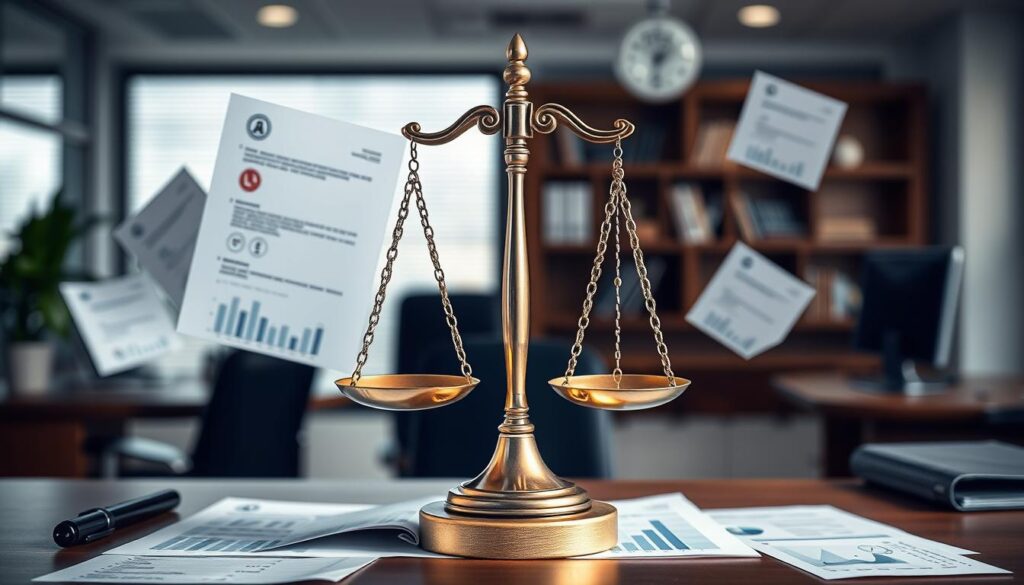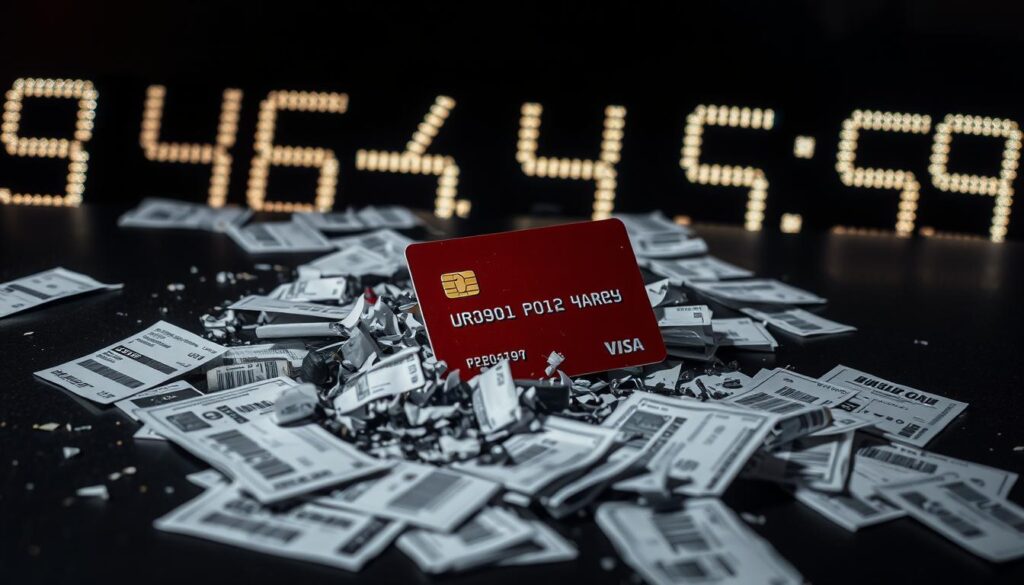A healthy credit profile is crucial for financial success. Sometimes, you may need to dispute a charge or report an error. Many wonder if disputing a charge affects their credit score.
This article explores credit card disputes and their impact on your credit. We’ll cover steps to protect your financial well-being during this process.
Key Takeaways
- Disputing a legitimate charge can temporarily lower your credit score, but it’s crucial to address any errors or unauthorized transactions.
- Understanding the impact of credit utilization, payment history, credit mix, and new credit inquiries is key to managing your credit score during disputes.
- The Fair Credit Reporting Act provides consumers with rights and protections when it comes to credit report disputes and investigations.
- Effective credit dispute strategies, including crafting persuasive letters and monitoring your credit reports, can help minimize the impact on your credit score.
- Timing and frequency of disputes, as well as addressing any underlying debt issues, are important considerations in maintaining a healthy credit profile.
Understanding Credit Score Impact
Your credit score reflects your financial trustworthiness. It’s influenced by credit utilization, payment history, credit mix, and new credit inquiries. These factors are crucial when dealing with credit disputes.
Credit Utilization and Payment History
Credit utilization is the amount of credit you’re using compared to your limit. Keeping it below 30% can boost your score. Payment history is the most important factor in credit scoring.
It shows if you’ve made timely payments on your accounts. A good payment history can significantly improve your credit score.
Credit Mix and New Credit Inquiries
Your credit mix includes different types of credit accounts you have. Lenders like to see a variety of credit types, such as cards, loans, and mortgages.
New credit inquiries happen when you apply for credit. They can temporarily lower your score. However, their impact decreases over time.
Understanding these factors helps you handle credit disputes better. You’ll know how they might affect your credit score.
| Credit Factor | Impact on Credit Score |
|---|---|
| Credit Utilization | High utilization can lower your score, while low utilization can boost it. |
| Payment History | Timely payments are the most significant factor in determining your credit score. |
| Credit Mix | A diverse mix of credit types can positively impact your credit score. |
| New Credit Inquiries | Multiple new credit applications can temporarily lower your score, but the impact diminishes over time. |
Credit Card Disputes Explained
Credit card disputes arise when consumers spot unauthorized transactions or billing errors. To resolve this, contact your card issuer and start an investigation. This process can lead to charge removal or account updates.
The credit card dispute process involves several key steps:
- Identifying the disputed charge: Review your statement carefully. Look for any transactions you don’t recognize or think are wrong.
- Contacting the credit card issuer: Reach out to your card company. Use phone, email, or their online system to start the dispute.
- Providing supporting documentation: Gather relevant receipts and evidence. Submit these to your credit card issuer to back up your claim.
- Awaiting the investigation: The card company will investigate the charge. This usually takes 30-60 days to determine if it’s valid.
- Resolution and account updates: Based on findings, the charge may be removed. Or, your account might be updated with correct information.
Understanding credit card disputes helps protect your finances. It also keeps your credit report inquiries accurate.

“Credit card disputes can be tricky. But they’re crucial for protecting your money and maintaining good credit.”
Does Disputing a Charge Hurt Your Credit
Disputing a charge can affect your credit score in various ways. The impact depends on the dispute’s nature, investigation outcome, and your credit profile’s health. Understanding these factors helps you manage the process effectively.
Factors Influencing Credit Score Changes
Several key factors can influence how a credit dispute affects your credit score:
- Dispute Outcome: A favorable resolution can boost your credit score. However, an invalid dispute might cause a temporary dip in your score.
- Credit Utilization: Disputing a charge may temporarily increase your credit utilization ratio. This can negatively affect your score until the dispute is resolved.
- Payment History: Stopping payments on a valid bill during a dispute can harm your credit score. It negatively impacts your payment history.
- New Credit Inquiries: The dispute process may lead to additional credit checks. These inquiries can temporarily lower your credit score.
The impact of a dispute on your credit score is often short-lived. Maintaining a healthy credit profile can help mitigate any negative effects.
| Factor | Potential Impact on Credit Score |
|---|---|
| Dispute Outcome | Positive if resolved in your favor, negative if found invalid |
| Credit Utilization | Temporary increase, which can negatively affect score |
| Payment History | Negative if you stopped making payments on the disputed charge |
| New Credit Inquiries | Temporary decrease due to additional credit checks |
Knowing these factors helps you navigate the dispute process more effectively. You can minimize potential impacts on your credit score by staying informed.
Fair Credit Reporting Act Protections
The Fair Credit Reporting Act (FCRA) protects consumer rights regarding credit information. This federal law sets up safeguards and outlines the credit dispute process. It helps people keep their credit reports accurate.
Consumer Rights and Dispute Process
The FCRA gives consumers the right to dispute wrong or incomplete credit report information. This includes errors in account history, payment status, and identity theft issues.
The credit dispute process lets people start investigations with credit bureaus. This helps fix problems and ensure credit information is correct.
- Identify the inaccurate or incomplete information on your credit report.
- Submit a written dispute to the credit bureau(s) responsible for the error.
- Provide supporting documentation to substantiate your claim.
- The credit bureau(s) must investigate the dispute and respond within 30 days.
- If the dispute is resolved in your favor, the credit bureau(s) must update your credit report accordingly.
Knowing your FCRA rights helps you protect your credit information. You can take steps to keep your financial health in check.
| Key FCRA Protections | Description |
|---|---|
| Right to Dispute Inaccuracies | Consumers can dispute any incorrect or incomplete information on their credit reports. |
| Credit Bureau Investigations | Credit bureaus must investigate disputes and respond within 30 days. |
| Correction of Errors | Credit bureaus must correct any verified errors on a consumer’s credit report. |
| Limitation on Negative Information | Negative information can only remain on a credit report for a certain period, typically 7-10 years. |

The Fair Credit Reporting Act gives you tools to manage your credit information. Use these rights to keep your credit report accurate and your finances healthy.
Credit Bureau Investigations
Credit bureaus investigate claims when you dispute your credit. Their findings can greatly affect your credit report and credit score. The outcome depends on what they discover.
These investigations ensure your credit report inquiries are accurate. They protect your finances by fixing errors in your report.
The Investigation Process
- The credit bureau will review the details of your dispute and gather information from the furnisher (the entity that provided the disputed information).
- They will then investigate the validity of the disputed item, verifying its accuracy and completeness.
- If the investigation determines that the information is inaccurate or incomplete, the credit bureau will update or remove the item from your credit report.
- If the investigation finds the information to be accurate, the disputed item will remain on your credit report.
Investigation results directly impact your credit score. Removing wrong info may boost your score. If the dispute fails, your score might stay the same or drop.
“Responsible credit bureau investigations are essential for maintaining the integrity of consumer credit reports.”
Know how credit bureaus investigate disputes on your credit report inquiries. This knowledge helps you manage your financial future.
You can ensure your credit profile shows your true creditworthiness. Address issues promptly to take control of your finances.
Legitimate Reasons for Disputing Charges
Credit card charges can be disputed for various valid reasons. Knowing these grounds empowers you to protect your finances. You can exercise your rights effectively when you understand dispute reasons.
Unauthorized Transactions
Unauthorized transactions are a common reason to dispute charges. This happens when your card is lost, stolen, or used fraudulently. Disputing these charges is vital to avoid liability and protect your credit history.
Billing Errors
Billing errors also warrant credit disputes. These include charges for items you never received or incorrect amounts. Duplicate charges are another type of billing error to watch for.
Identifying and disputing these errors ensures you only pay for legitimate charges. It helps maintain the accuracy of your account statements.

“Disputing legitimate unauthorized transactions and billing errors is a crucial step in maintaining the accuracy of your credit report and protecting your financial well-being.”
Understanding valid dispute reasons helps you safeguard your credit and finances. Stay vigilant and address discrepancies promptly. This approach prevents illegitimate charges from negatively impacting your credit score.
Credit Repair Strategies
Credit disputes can impact your credit score negatively. However, proven strategies can help repair your credit over time. These methods can help you bounce back and rebuild your financial standing.
Improving Credit Score After Disputes
Regularly monitor your credit reports to improve your score after a dispute. This helps identify remaining inaccuracies or unresolved issues affecting your score. Address these problems through further disputes or negotiations to regain control.
Build a positive credit history through responsible financial management. Make all payments on time and keep credit card balances low. Diversify your credit mix to demonstrate your ability to manage credit responsibly.
| Credit Repair Strategy | Description |
|---|---|
| Monitor Credit Reports | Regularly review your credit reports to identify and address any remaining inaccuracies or unresolved issues. |
| Maintain On-time Payments | Make all your payments, including credit card, loan, and utility bills, on time to demonstrate responsible credit management. |
| Keep Credit Utilization Low | Maintain low credit card balances in relation to your available credit limits to improve your credit utilization ratio. |
| Diversify Credit Mix | Incorporate a variety of credit types, such as credit cards, loans, and mortgages, to demonstrate your ability to manage different types of credit. |
Using these credit repair strategies helps you regain control of your finances. Implementing these methods for improving your credit score after disputes can lead to long-term financial success.
Crafting Effective Credit Dispute Letters
Credit dispute letters are vital for challenging errors on your credit report. They form the basis for addressing inaccuracies. Well-crafted letters with clear evidence can boost your chances of success.
A good credit dispute letter should follow a specific format. It needs to include several key elements for the best results.
- Clearly state the specific item(s) you are disputing on your credit report.
- Provide a detailed explanation of why the item is inaccurate or unverifiable.
- Gather and include supporting documentation, such as receipts, invoices, or correspondence, to substantiate your claim.
- Request that the credit bureau investigate the disputed item and provide you with the results of their investigation.
- Ensure that your letter is sent via certified mail, with a return receipt requested, to create a paper trail.
A well-formatted credit dispute letter can greatly impact your credit dispute process. It boosts the chances of removing wrong information from your report.
Following these guidelines can lead to more successful credit dispute letters. This approach helps protect your financial reputation.
| Key Elements of Effective Credit Dispute Letters |
|---|
| 1. Clearly state the disputed item(s) |
| 2. Provide a detailed explanation of the inaccuracy |
| 3. Include supporting documentation |
| 4. Request a credit bureau investigation |
| 5. Send the letter via certified mail |
“Crafting effective credit dispute letters is essential for successfully challenging inaccuracies on your credit report.”

Timing and Frequency of Disputes
Disputing credit charges requires careful timing and frequency. Knowing the best practices for submitting disputes can help protect your credit score. It can also make the process more effective.
Timing Your Disputes
Act quickly when disputing credit charges. File within 30 to 60 days of the transaction appearing on your credit report. This aligns with the Fair Credit Reporting Act (FCRA) guidelines.
Frequency of Disputes
Address inaccuracies on your credit report promptly. However, avoid filing frequent disputes without valid reasons. Too many disputes may look like credit “gaming” to bureaus.
Review your credit report regularly. Address discrepancies as they appear. Don’t wait for issues to pile up.
Best Practices for Dispute Submission
- Be organized and thorough: Gather all relevant documentation, such as billing statements, receipts, and any correspondence with the creditor, before submitting your dispute.
- Follow the credit bureau’s dispute process: Each credit bureau has its own specific guidelines for filing disputes, so be sure to follow their instructions carefully.
- Communicate clearly and concisely: Clearly explain the nature of the dispute and provide a detailed account of the issue, along with any supporting evidence.
- Monitor the progress of your dispute: Keep track of the dispute’s status and follow up with the credit bureau if you don’t receive a response within the expected timeframe.
Understanding dispute timing and frequency is crucial. Following submission best practices helps address credit report inaccuracies effectively. This approach maintains a healthy credit profile.
“Timing and organization are key when it comes to disputing credit charges. Adhering to best practices can help you navigate the process with confidence.”
Credit Report Inquiries and Impact
Credit report inquiries play a crucial role in your credit profile. They occur when lenders check your credit history. These inquiries can affect your credit score in different ways.
Two main types of inquiries exist: hard inquiries and soft inquiries. Hard inquiries happen when you apply for new credit. They can lower your score by a few points.
Soft inquiries occur for pre-approvals or background checks. These don’t affect your credit score. They also happen when you review your own credit report.
Credit disputes may involve multiple hard inquiries. This happens as credit bureaus investigate disputed items. These inquiries are necessary to fix inaccuracies.
The Fair Credit Reporting Act protects consumers. It ensures dispute-related inquiries don’t harm your credit score long-term.
To protect your credit, limit new credit applications. Focus on maintaining good credit utilization and payment history. Also, keep a healthy mix of credit types.
“Monitoring your credit report for accuracy and disputing any errors can help you maintain a healthy credit score and protect your financial well-being.”
Monitoring Credit Reports for Accuracy
Keeping your credit information accurate is vital for your financial health. Regular checks of your credit reports help spot and fix any errors.
Review reports from Experian, Equifax, and TransUnion often. These show your credit history, payment records, and current debts.
By monitoring your credit reports, you can find and dispute mistakes quickly. This protects your credit report accuracy and keeps your credit score healthy.
Set reminders to check your reports yearly or twice a year. This helps you stay on top of changes and address issues promptly.
Staying alert about your credit reports is key to financial success. It ensures your credit history reflects your true creditworthiness.
By being vigilant, you can maintain an accurate credit score. This helps you reach your money goals more easily.
Debt Validation and Dispute Rights
The Fair Debt Collection Practices Act (FDCPA) protects consumers from unfair debt collection. It gives you the power to dispute debts and request validation. These rights help you address inaccuracies in your debt records.
Understanding the Fair Debt Collection Practices Act
The FDCPA is a federal law that shields consumers from abusive debt collection. It allows you to dispute debts and request debt validation from collectors.
Debt collectors must send you a written notice within five days of contacting you. This notice outlines your rights and the debt amount. If you dispute the debt in writing within 30 days, collection efforts must stop.
The collector must then verify the debt and provide you with documentation. This process ensures that the debt is valid before collection continues.
- The FDCPA prohibits debt collectors from engaging in harassment, making false statements, or using unfair practices to collect a debt.
- Consumers have the right to request that a debt collector cease further communication, except to notify them of any specific action they intend to take.
- The FDCPA also allows consumers to seek legal action against debt collectors who violate their rights, potentially resulting in monetary damages and other relief.
Knowing your dispute rights helps you navigate debt collection effectively. The FDCPA ensures that collectors respect your rights throughout the process.
Conclusion
Credit disputes play a vital role in maintaining accurate credit information. Understanding their impact on your credit score is crucial. You can protect your financial health by learning about consumer rights and dispute procedures.
Addressing unauthorized transactions or billing errors requires diligence and determination. The Fair Credit Reporting Act and Fair Debt Collection Practices Act offer important protections. These laws help you resolve inaccuracies on your credit report.
A healthy credit score is key to your financial well-being. Mastering credit disputes empowers you to navigate the credit landscape. This knowledge allows you to take control of your financial future.

